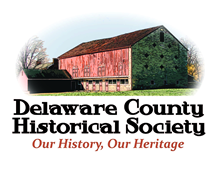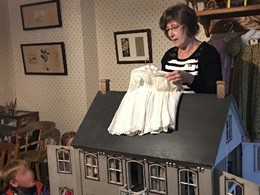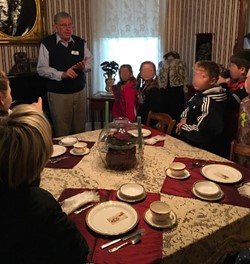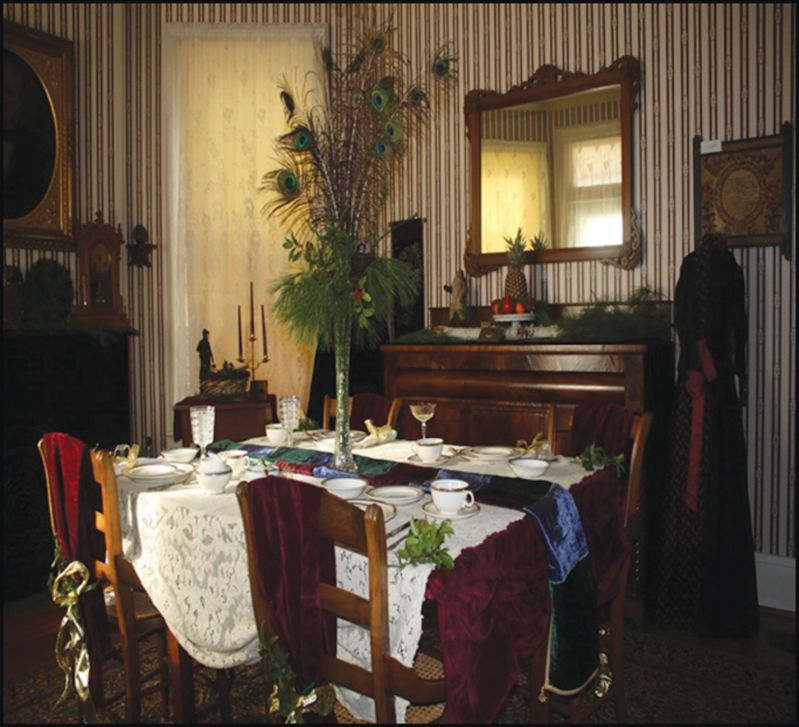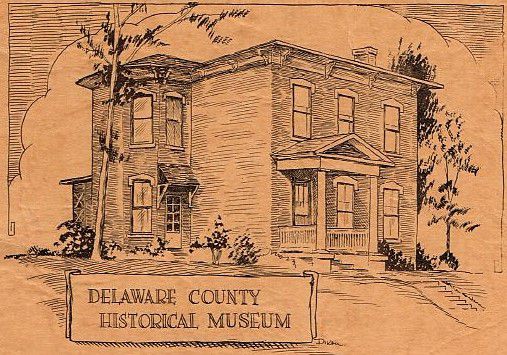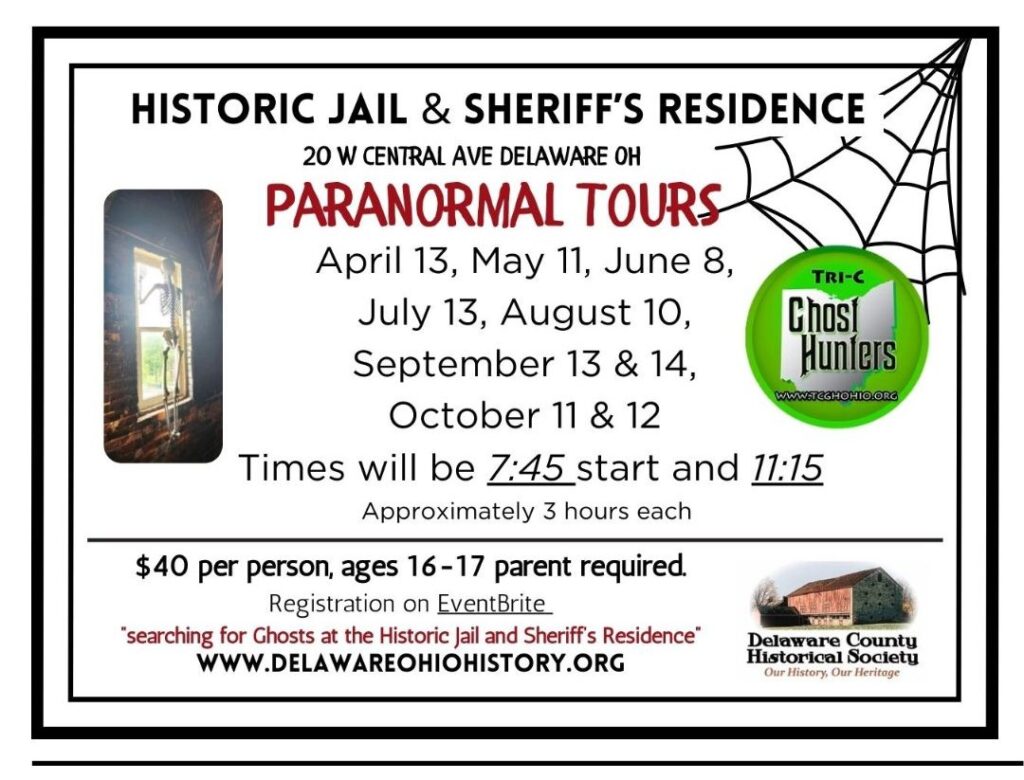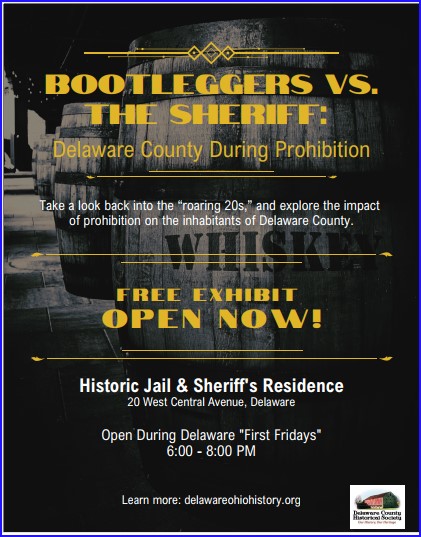MUSEUMS
& EXHIBITS
- MEEKER HOMESTEAD MUSEUM
- NASH HOUSE MUSEUM
- THE HISTORIC JAIL AND SHERIFF'S RESIDENCE
- CRYDER RESEARCH LIBRARY
- MILLWORKER COTTAGE
- THE BARN AT STRATFORD
The Meeker Homestead Museum house.
-
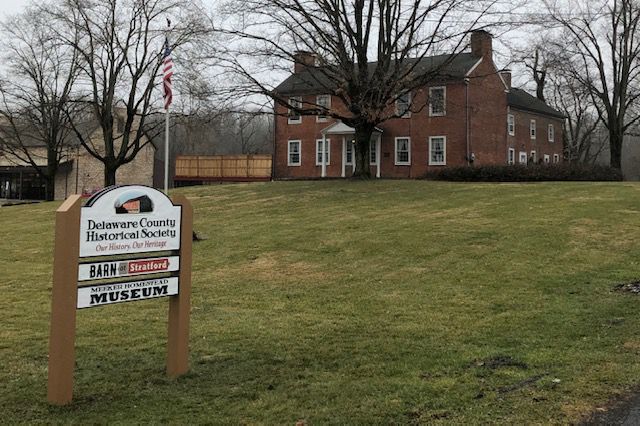
Meeker with new Signage -
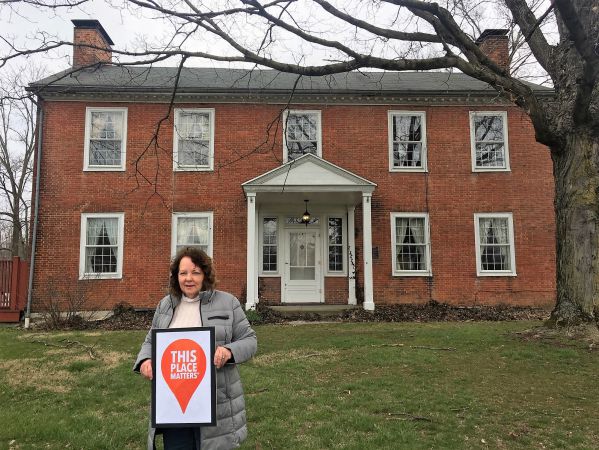
Donna Meyer This Place Matters -
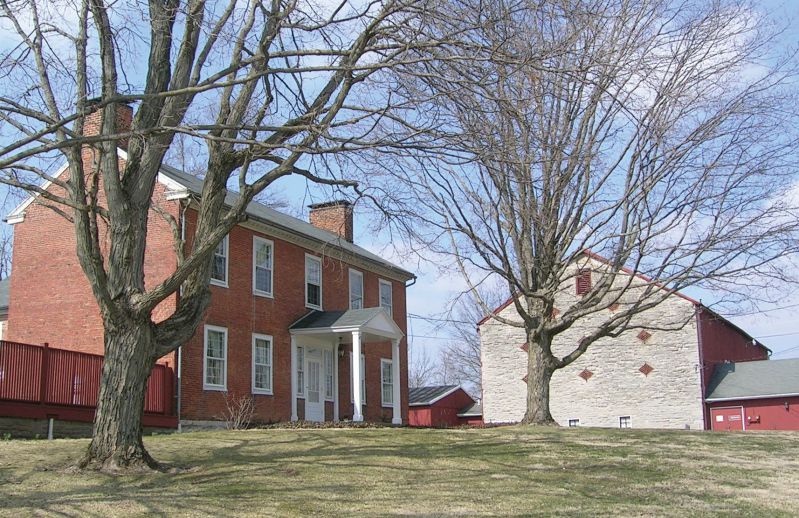
Meeker Homestead and Stone End Barn -
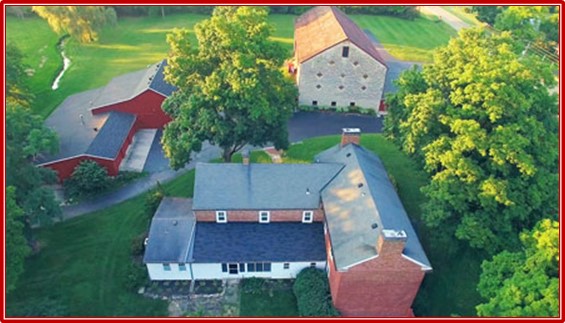
Meeker Homestead, Museum, and Barn at Stratford -
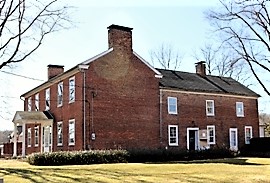
Meeker Entrance on Side
The Meeker Homestead Museum is a museum in a house that is located at 2690 Stratford Road. The Forrest Meeker House is one of the oldest, built 1823, and most prominent historic homesteads in Delaware County. This historic home has been transformed into a fine educational museum of the early settlement of the Ohio country.
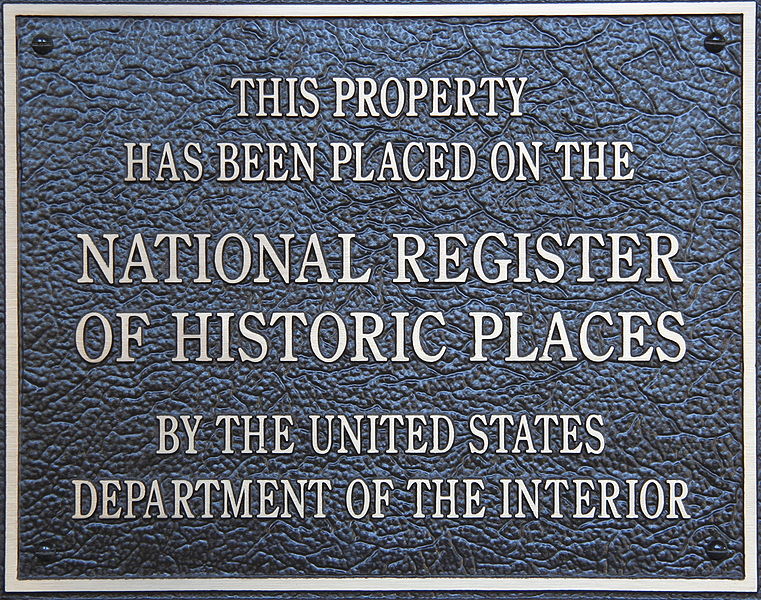
About The Museum
- Free Admission (suggested donation $5)
- Free Parking
The Meeker Homestead Museum is Open
- Open to the Public: the 1st Sunday of each Month from 1pm to 4pm, April through November.
- Also Open By Appointment:
- by Email meekermuseum@delawareohiohistory.org
- by Phone 740-369-3831 ext 3
Current Museum Exhibits
| Current Exhibits | Where (Room) |
| “Journey to Delaware County” | Delaware Gallery & Whetstone Room |
| Stratford History Exhibit (Expanded and Improved) | Gilman Room |
| Spinning Exhibit (Expanded and Improved) | Beard Room |
| The American Indians in Delaware County | American Indian Gallery |
| Delaware Chair Co. | Bieber Room |
| Upcoming Exhibits | Where (Room) |
| The Settling of Delaware County – “Wildness to Civilization, 1825-1860’s |
To Be Announced |
| Garth’s Auction Business | |
| Archaeology Camp |
Timeline of the Meeker Property Click here
Evolution of the Forrest Meeker House Click here
CLICK HERE to get directions
The Nash House Museum – on East William Street
The NASH HOUSE MUSEUM, a historic home located at 157 E.William Street (lot # 635 old lot #18) was built for Thomas and Mina Slattery in 1878.
Enjoy this brief tour of the Nash House Museum in Delaware County, Ohio. Then, come visit us for a full tour guided by a docent from the Delaware County Historical Society.
[embedyt] https://www.youtube.com/watch?v=SJfdTYgj7xY[/embedyt]
The Nash House Today – A Historic Home
The Nash House remains much the same as it was when the young Slattery family first lived here in 1878. There have been the obvious electrical, heating and plumbing upgrades over the years, but the “bones” of the house remain original. The front porch was added after 1916 and a bathroom addition and a kitchen remodel were completed in the 1930’s. The house does show signs of normal wear and tear. If you look closely, you can see the scars in the doorways made by Linnie Nash’s wheelchair (Linnie was left an invalid after a severe bout with scarlet fever). The Nash House is furnished with period pieces and accessories donated to the Historical Society by Delaware County families. These furnishings and the reproduction wall paper make the house a showcase of the Victorian period
Click to learn The History of Slattery / Nash Families
The Nash House Museum is Open
|
The Historic Jail and Sheriff’s Residence
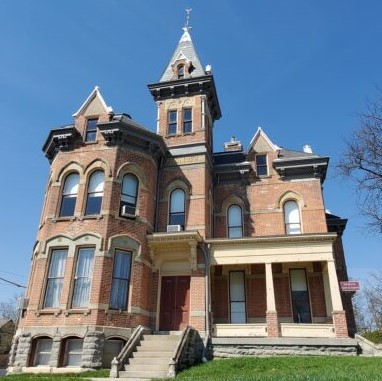 Constructed in 1878 by David Gibbs of Toledo, the old Historic Jail and Sheriff’s Residence was in use until 1988 and was listed on the National Register of Historic Places in 1990. This beautiful, primarily Italianate structure features some Gothic Revival and Second Empire details. The 8,500 square foot building contains sixteen cells that were used for men and two used for women.
Constructed in 1878 by David Gibbs of Toledo, the old Historic Jail and Sheriff’s Residence was in use until 1988 and was listed on the National Register of Historic Places in 1990. This beautiful, primarily Italianate structure features some Gothic Revival and Second Empire details. The 8,500 square foot building contains sixteen cells that were used for men and two used for women.
As part of the prison reform movement of which Rutherford B. Hayes championed, this building served as the sheriff’s home. The sheriff’s wife, known as the “Matron,” cooked meals and cared for the inmates.
This newest museum features several displays and period furniture, and the cell block is open for tours.
Discover the secrets of this 144-year iconic building in downtown Delaware.
The Historic Jail and Sheriff’s Residence
20 West Central Avenue, Delaware Ohio 43015 map
Free Parking behind the building
The Historical Jail and Sheriff’s Residence is OpenEvery First Friday from 6 – 8 pm Check our 2024 schedule of public and private
|
|
Research Library – next to the Nash House Museum
The Cryder Historical Center and Research Library is located at 157 E. William St and it’s the place to go to learn more about Delaware County’s rich history. It comprises a Historical Library, an Archives Repository, a Historical Museum, and a Research Center. The library is operated by local volunteers interested in helping you.
Resources Available in the Research Library:
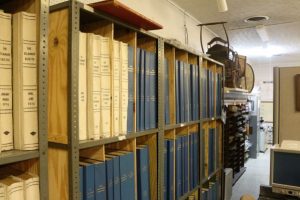
- Delaware County Archives:
- Delaware Gazette Photographs
- Garth’s Auction Catalogues
- Delaware County Newspapers
- Delaware County History Books
- Delaware County Obituary Archives
- Delaware County Maps and Atlases
- Delaware County Property Transfers 1800-1891(Mendenhall Files)
- Delaware Clipping Files by Subject (Vertical File)
- Delaware City and Rural Route Directories
- School Yearbooks for: Ohio Wesleyan University, Delaware High Schools
- Museum of Delaware County Historical Items including:
- The McCabe Desk on which in 1874 the Women’s Christian Temperance Union constitution was written
- President Lincoln’s blood from the Ford Theater Assassination
- The largest public collection of Presidential Easter Eggs
-
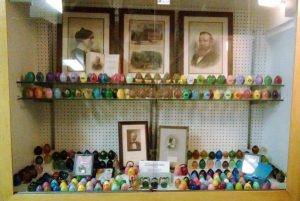
Presidential Easter Egg Collection
The Cryder Historical Center and Research Library is Open
- Sundays from 2-5pm and Wednesdays from 10-noon and 1 to 5pm
- Other day/times by appointment
- Make appointments:
- by Email librarian@delawareohiohistory.org
- by Phone 740-369-3831 ext 2
CLICK HERE to get directions
Millworker Cottage – on Stratford Road at Meeker Way
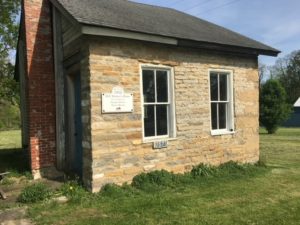
Millworker Cottage viewed from Stratford Road
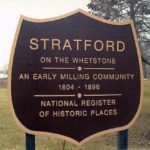 Stratford Ohio, along the banks of the Olentangy River, was a thriving mill town in the 1800s. Mills required lots of workers and workers need homes and lodging. The National Registry of Historic Places notes that Stratford had saved several the original buildings from that historic era.
Stratford Ohio, along the banks of the Olentangy River, was a thriving mill town in the 1800s. Mills required lots of workers and workers need homes and lodging. The National Registry of Historic Places notes that Stratford had saved several the original buildings from that historic era.
You can step into an 1800s Millworker Cottage and feel like you’ve stepped back in time.
Who lived here: Henry Breyfogle, who worked in the nearby paper mill, owned this property from 1866 to 1913. Henry and his wife raised 5 children in this small home. The Cottage is furnished as it would have been in the mid1800s.
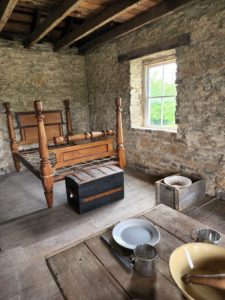
Interior View
How the cottage was conserved for history
Ohio Edison (First Energy) purchased the property in 1956. In the 1990s the Olentangy River Valley Association was granted, by Ohio Edison, to maintain the property. The ORVA did more than maintain. They put on a new roof and removed the wood frame addition from the building and restored the building to its original design.
The developers of Coughlin Crossing purchased the building and donated it to the Delaware County Historical Society. The historic building is exhibited as a Millworker Museum.
Donations to the Delaware County Historical Society provided funds to further repair and restore the building.
Donations for the Millworker Cottage can be made at the Meeker Museum or Click to Donate Online
The Millworker Cottage
2571 Stratford Road, Delaware Ohio 43015 map
The Millworker Cottage is Open from April – November
- The First Sunday of each month from 1pm to 4pm
- The Meeker Homestead Museum is Open these same times
The Garth Oberlander/The Barn at Stratford
The Garth Oberlander / Barn at Stratford was built in 1848 and is located at 2690 Stratford Road and it has a rich history including Garth’s Auctions for decades. It is now The Barn at Stratford a historic barn event venue.
Features of The Barn
- This historic barn is a Pennsylvania style bank barn
- The barn is a stone-end barn
- The foundation is of local stones
- The framing is of hand-hewn beams. You can still see the nails and notches of the horse stalls in the barn’s lower level.
A Storytelling Video of the Barn
[embedyt] https://www.youtube.com/watch?v=zNvEwE7RmWg[/embedyt]
History of the Barn
Forrest Meeker left Vermont in 1797, tried settling in in Pennsylvania, Southern Ohio, and Kentucky before buying 624 partially-cleared acres along the Olentangy River, including a wooden grist mill on the river, from John Beard in 1811. The original log house he likely built for his family has disappeared from the landscape, and the early years of settlement were surely complicated by the War of 1812-14, when American forces used the road along the Olentangy as a major supply route for the effort to defeat the British at Lake Erie. Colonel Meeker served as Quartermaster for General William Henry Harrison’s army during the war, and with profits from supplying the army with provisions from the day and night operations of his mill, he was able to build a fine brick home in 1823. He added the west wing to the rear of the house several years later as the family grew. The milling operation on the river also grew, as did the settlement of the Stratford and Delaware areas and, in 1829, Meeker added facilities for the carding and fulling of wool from surrounding sheep farms. In 1838, the mill was sold to Judge Hosea Williams and Caleb Howard, who established a paper mill on the river.
George Bieber builds the Barn
Colonel Meeker died in 1845, and the entire 624 acre farm was acquired by George Bieber, a neighboring farmer, and in 1848 he built the fine stone-end barn we see today, as well as a similar barn he built a half mile to the north. Bieber died in 1855, and the property went through several splits and changes in ownership among his heirs and others until the homestead was acquired by the A. C. Miller Co. (which later became Union Fork and Hoe, Inc.) in 1920.
Garth Oberlander Barn and Garth’s Auctions
Records show that the homestead was operated as a farm by tenants until Garth Oberlander, a recent Ohio Wesleyan University graduate, bought the property in 1941, farmed it for several years, and began his antique business, Garth’s Antique Auction, in the 1950s. Tom and Carolyn Porter joined the firm in the 1960s, were mentored by Oberlander, eventually took over and expanded the antique auction business in the 1970s, and raised their family in the Meeker House, as Oberlander had done before them. When the Porters retired in the early 2000s, the auction business continued under the ownership of Jeff and Amelia Jeffers, and remains a nationally known antique auction house. In 2010 the Porters, who had retained ownership of the real estate, sold the corner to Turkey Hill, and donated the remainder, with all of the historic buildings, to the Delaware County Historical Society.
Garth Oberlander Barn becomes The Barn at Stratford
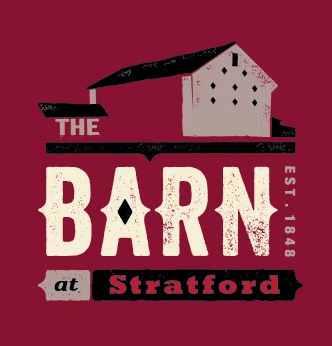
This historic property and 1848 barn have been transformed into The Barn at Stratford, a Historic Barn Event Venue. The Delaware County Historical Society operates The Barn at Stratford to make it available to the community and to generate the funds needed to restore, maintain, and improve this magnificent piece of Delaware County History. The barn and grounds are available for weddings, special occasions, business or corporate events, or community events.
The Delaware County Historical Society conserves and operates several historic buildings in Delaware County Ohio: The Cryder Historical Center, on East William Street, comprising the Nash House and the Research Library & The Meeker Homestead on Stratford Road, including: The Meeker Homestead Museum and The Barn at Stratford & The Historic Jail and Sheriff’s Residence on West Central Avenue.
